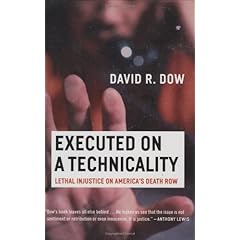Book review: Executed on a Technicality
 In a previous post, I noted that we abolitionists are well aware of the injustices around the death penalty but sometimes need to hear the stories again to remember the horror that is capital punishment. It is, at times, easy to get caught up in the nuts and bolts of activism.
In a previous post, I noted that we abolitionists are well aware of the injustices around the death penalty but sometimes need to hear the stories again to remember the horror that is capital punishment. It is, at times, easy to get caught up in the nuts and bolts of activism.Executed on a Technicality: Lethal injustice on America's death row by David R. Dow, law professor at the University of Houston, is that wake-up call, that jolt, that splash of cold water in the face. The stories Dow tells are horrifying, and he lays out in great detail the ways that all three branches of government and both political parties have let down the cause of justice.
I found it especially helpful that Dow explains the 1996 Anti-Terrorism and Effective Death Penalty Act, which was passed by a Republican-controlled Congress and signed by Democratic President Bill Clinton. The piece of the law that sticks with me is that a defendant cannot raise an issue in federal court if it was not raised in state court. Thus, if a defendant is saddled with an incompetent attorney during state appeals or new evidence appears after state appeals are exhausted, this cannot be presented at the federal level.
The law is a nightmare and has probably led to the execution of an innocent person/people.
It's hard to say which story sticks with me the most. One that stands out is the Mexican national who was held in Texas on murder, under dubious evidence. Mexican police took his parents into custody and threatened to torture them if he did not confess to the Texas murder. He confessed and included a statement that his parents had nothing to do with it, which would be an odd statement if a person didn't know that his parents were being held in Mexico.
He was convicted and went insane on death row, to the point that he stopped recognizing his lawyers, had loud outbursts, and spread feces in his cell.
I have one beef with Dow. Throughout the book, he has a schizophrenic relationship with the issue of innocence. He tells compelling stories of likely innocence but several times makes statements that imply that the innocence issue should be de-emphasized.
Most of us are not in this movement simply because innocent people are sentenced to death. We're in it for all of the other reasons- race, injustice against the poor, creating more violence in our society.
But the simple fact of the matter is that the innocence issue has moved the public to a newfound skepticism of the death penalty in a way that the other issues did not in the 24 years from the reinstatement of capital punishment in 1976 to the Illinois moratorium in 2000. Innocence has opened up relucant supporters of the death penalty to all of our other arguments against it.
Dow's book is a must read. It took me more than two months to read it because I could only read about 10-15 pages at a time. It is a real-life horror story. He deserves props for writing it and also for dedicating himself as a lawyer to this difficult but noble cause.

0 Comments:
Post a Comment
<< Home